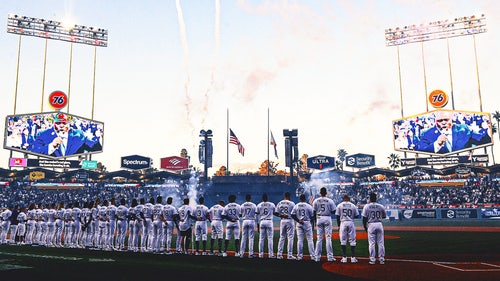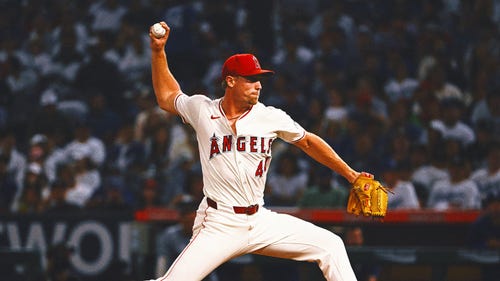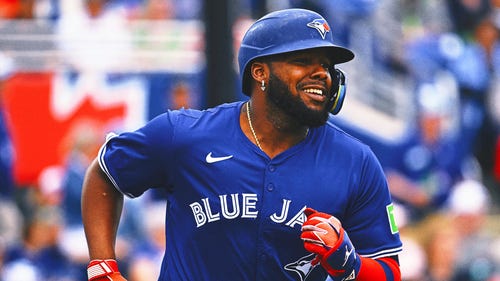
MLB playoffs 2021: What the 2018 Astros-Red Sox series tells us about this year's ALCS
By Jordan Shusterman
FOX Sports MLB Writer
After Houston won Game 1 in dramatic fashion Friday night, Red Sox fans were quick to point out what happened the last time these two teams met in the ALCS and the Astros went up 1-0.
In 2018, Boston bounced back in Game 2. Sure enough, that’s exactly what happened again in 2021, with the Red Sox cruising to an easy 9-5 victory Saturday and tying the series before heading home for the next three games.
Three years ago, the Game 1 loss ended up being Boston’s only defeat in the ALCS, as the Red Sox cruised to four straight wins to clinch a trip to the World Series. But if this rematch feels like a rerun so far, it’s probably worth revisiting that 2018 series and identifying the true similarities and differences between the two renditions of Red Sox-Astros.
Some of the main characters remain, but three years is an eternity in baseball. A lot has changed between these two squads.
Let’s dig in.
What’s the same for Boston?
One obvious place to start is that the guy playing center field is on an epic hot streak. In 2018, it was Jackie Bradley Jr., who drove in a ridiculous nine runs despite notching only three hits in the series. It certainly helped that one of them was a grand slam.
This time around, it’s Kiké Hernández, who is in the middle of a hot streak for the ages. He is 16-for-32 this October with five homers. It didn’t seem possible that we could see another Randy Arozarena-like run in the postseason, let alone just a year later, but if Hernandez keeps this up, that’s the territory we’re talking about. He has been completely unbelievable at the plate and playing spectacular defense in center to boot:
Furthermore, J.D. Martinez and Rafael Devers are still chillin’ in the middle of Boston's batting order. Each has a homer against Houston in both rounds of this LCS showdown.
On the pitching side, Chris Sale and Nathan Eovaldi have both made starts in this series, just as they did three years ago, and Eduardo Rodríguez has an even bigger role this time. Ryan Brasier is the only pure reliever still coming out of the bullpen for Cora.
What’s the same for Houston?
The 2018 infield is entirely intact. Yuli Gurriel, Jose Altuve, Carlos Correa and Alex Bregman have now played more postseason games together than any other infield in MLB history.
After being acquired at the deadline in 2018, Ryan Pressly is the only Astros reliever left from that season. Pressly’s nasty fastball/curveball combo is a familiar sight for playoff opponents, and he has become the primary closer for Houston after mostly being used in the seventh and eighth innings in years past.
What’s different for Boston?
Well, Mookie Betts isn’t around anymore. His trade counterpart, Alex Verdugo, is now in the Boston outfield, flanking Hernandez in center with Hunter Renfroe in right field. Andrew Benintendi now plays for Kansas City. The Killer B’s are no longer, but this outfield group has had its moments just the same.
Craig Kimbrel, who recorded a save in three of Boston's four ALCS wins in 2018, wears white socks now. With Matt Barnes no longer on the roster, there doesn’t appear to be a capital-C Closer on this team, though Garrett Whitlock seems to be the likeliest candidate moving forward. A Rule 5 pick is quite a different flavor than a possible future Hall of Famer in Kimbrel, but if the dude gets outs, that’s all that matters, and Whitlock has done that all year.
Overall, the 2021 bullpen looks vastly different outside of Brasier, who was one of the breakout stars of the 2018 run and has looked stellar again down the stretch this year.
What’s different for Houston?
The enormous Correa and Altuve homers in Game 1 were actually a good reminder of how different things were for those two in 2018. That was probably Altuve’s worst postseason series offensively, besides the 2015 ALDS against Kansas City. Correa, meanwhile, was batting seventh in 2018 following a disappointing, injury-laden season in which he played only 110 games and posted a .728 OPS.
They both looked like superstars the year before during the 2017 run, but they were clearly not at their best the last time these two teams squared off at this postseason juncture. Boston ain’t so lucky this time around — those dudes are locked in.
Also, George Springer is no longer around, which is still pretty weird considering how synonymous he became with Astros postseason baseball. But production-wise, the Astros haven’t lost much of a step, as Michael Brantley, Yordan Alvarez and Kyle Tucker have made the Houston lineup more balanced than it used to be. The Astros' best left-handed bats in 2018 were switch-hitting Marwin Gonzalez, Josh Reddick, Tony Kemp and Brian McCann in his final season.
Replacing Springer isn’t easy, but to help make up for his absence, the rest of the lineup experienced an upgrade. Now Chas McCormick and Jake Meyers patrol Springer’s old stomping grounds in center, and they aren't bad at hitting either.
As for the pitching, it’s essentially an entirely new group for Houston beyond Pressly, especially with Lance McCullers Jr. out due to a forearm injury. The veteran-heavy rotation of Justin Verlander, Gerrit Cole, Dallas Keuchel and Charlie Morton is long gone, replaced by the talented but less-experienced Framber Valdez, Luis Garcia, José Urquidy and Cristian Javier.
And, of course, Dusty Baker is Houston's manager now! I don’t know what Dusty was doing during the 2018 ALCS, but it could have been anything. He’s Dusty Baker!
What did we learn from the first two games?
Given the way the first two games went — and how the pitching is lined up — it seems very likely that the high-powered offenses will continue to thrive. Three years ago, the two teams boasted strong lineups, but they faced much deeper pitching staffs.
Across five games in 2018, Houston and Boston combined for 50 runs on 77 hits, 11 of which were home runs. Through the first two games this year, 23 runs have already been scored on 40 hits, nine of which have been dingers.
The domino effect caused by the loss of McCullers in this round has already proven to be a huge challenge for the Astros. Jake Odorizzi was thrown to the wolves in Game 2 after Luis Garcia got hurt, and now Houston is relying on Urquidy for Game 3.
On the other side, Sale hasn't looked anywhere near his best thus far this postseason, so it’s not like Red Sox fans are eager to give him the ball again as soon as possible, the way they were in 2018.
Seven-game series are daunting to plan for, and I think this one will likely come down to which pitching staff can cobble together enough run prevention in Games 4 and 5, when the pitchers will presumably be at their weakest.
The lineups won’t care, though. They will keep on slugging, and all those balls launched into the Crawford Boxes in Houston will be soaring off or over the Green Monster.
What’s gonna happen this time?
The fact that Boston won in five games in 2018 somewhat undersells how close that series was — or at least could have been.
Game 4 had two pivotal moments that could have swung the series in a significant way — and both went in Boston’s favor. The first was the infamous fan interference call on Altuve’s fly ball to right field in the first inning that might have been a go-ahead home run but was ultimately ruled an out:
Then there was the spectacular Benintendi catch with the bases loaded to end it:
Point being: As lopsided as it looks in retrospect, Houston wasn't getting blown away in that series.
Also, for as much as we should probably stop underestimating the 2021 Red Sox, I have a hard time believing they will win the next three games like they did in 2018. That 2018 team won a league-high 108 games in the regular season and lost only three times in October en route to the title.
Maybe we are watching another never-ending hot streak for Cora’s team, and you could argue that it would be easier to pull off a gentleman's sweep this year, with the next three games in Boston. But I think this Astros offense is too good to hold down, and we’ll need six or seven games to decide the 2021 American League pennant.
I still lean Houston, oh-so-slightly. That said, if Boston does ultimately pull it off, one question remains: Who is about to become Steve Pearce?
Jordan Shusterman is half of @CespedesBBQ and a baseball analyst for FOX Sports. He lives in D.C. but is a huge Seattle Mariners fan and loves watching the KBO, which means he doesn't get a lot of sleep. You can follow him on Twitter @j_shusterman_.










